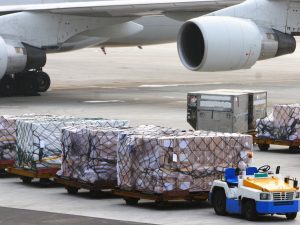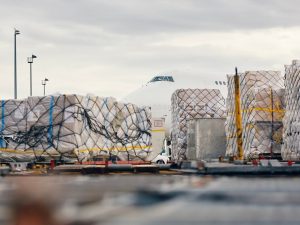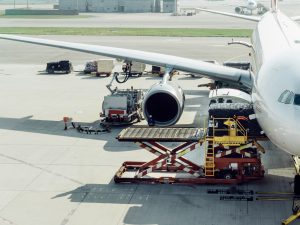Sunil Kohli, MD, Rahat Cargo said, “The supply chain is a titanic industry which forms the backbone of global commerce and hence robust & advanced technology is needed to ensure optimal efficient and prompt results. The Industry driven by digital transformation is now becoming integral to modern logistics. However, entering into such modernisation has not been an easy task for the stakeholders as they face several challenges such as the cost of upgrading legacy systems to finding the right people to operate those systems. Moreover, Implementing new technology often requires substantial financial investment which seems to be a major deterrent before the industry players.”
Read More »Pune Airport records surge in air freight, handles 144 MT of cargo in single day
Pune Airport handled an unprecedented 144 metric tonnes of cargo between 6 a.m. on June 3 and 6 a.m. on June 4, 2025 and recorded its highest-ever freight volume in a single day. This operational milestone signals a new era for the city’s logistics ecosystem and underscores its emergence as a critical air cargo hub in western India, said reports. Of the total cargo moved, 72.73 metric tonnes were inbound while 71.24 metric tonnes were outbound. The spike in freight traffic reflects not only the surging industrial activity in and around Pune but also a broader shift towards faster, air-based supply chain models across India’s manufacturing corridors, said airport officials in report. Pune’s flourishing auto components, IT hardware and pharmaceutical clusters are driving higher volumes of time-sensitive shipments. Moreover, exporters from Maharashtra’s industrial heartland increasingly prefer air freight over road or rail to meet delivery timelines and global service-level agreements.
Read More »Hellmann to expand express airfreight offering in India, APAC, ME
Hellmann Worldwide Logistics is expanding its digital airfreight express solution, HEX, to North America with plans to roll the product out its product in Asia Pacific, India, the Middle East, Africa and Europe later this year. The door-to-door HEX solution, which is already live in Germany, the UK and Ireland, will be added to its US and Canada operations at the end of June. In the latter half of the year, Hellmann has plans to expand HEX to additional countries in the Americas as well as numerous markets in Asia Pacific, India, the Middle East, Africa and Europe. The goal is to offer this product in around 50 countries by the end of 2026. The service is tailored for small and medium-sized businesses and uses courier networks to bundle shipments centrally, with customs clearance managed by the express carriers. “The service is particularly valuable for imports to the US in view of the current US customs policy updates,” Hellmann said in a press release. The platform offers companies access to globally negotiated terms and conditions, removing the need for individual contracts with courier, express and parcel service providers. It also offers real-time shipment tracking, detailed analysis, and booking and invoicing processing via a central digital user interface, developed by software firm Shipsy. “HEX offers our customers an innovative solution that combines cost savings, reliability and excellent customer service,” said Timo Schamber, global airfreight vice president at Hellmann. “The cross-carrier customer service benefit is especially notable in the volatile and often fragmented courier and express services sector, where customers can use a single, dedicated contact person for all their needs.” Soham Chokshi, Shipsy’s co-founder and chief executive, added, “By integrating our …
Read More »CTRAM, Aviral join forces to strengthen Indian logistics
Centre for Transportation Research and Management (CTRAM), an autonomous body under the Ministry of Railways and Aviral Consulting have signed MoU to co-create knowledge and drive application-based, outcome-oriented solutions for the Indian logistics industry. This collaboration seeks to leverage the complementary strengths of the public and private sectors to foster meaningful advancements in logistics research and innovation. By combining CTRAM’s institutional knowledge and policy insight with Aviral Consulting’s industry expertise and implementation capabilities, the partnership aims to create impactful, scalable solutions tailored to the evolving needs of India’s logistics ecosystem, stated release. The collaboration will focus on several critical areas like multimodal transport integration, increasing rail freight share, advancing sustainability practices, developing smart logistics frameworks and promoting opportunities in skill development. Together, CTRAM and Aviral aim to bridge the gap between policy, planning, and on-ground implementation, contributing to a more resilient, technology-enabled, and sustainable logistics in India. Amit Kumar Singh, CTRAM said “Collaborative logistics research led by the CTRAM can unlock transformative application-oriented solutions—enhancing efficiency, enabling multimodal integration, and shaping a resilient, future-ready freight ecosystem for the nation.” Surendra Ahirwar, ED, Ministry of Railways, added “Collaboration between CTRAM and Aviral will add insights around demand flow, changing paradigm of cargo business, pricing and customer needs, in turn which will help Railways in newer strategies in freight and parcel segment”. Dr Vikash Khatri, Founder, Aviral Consulting, added “Logistics is a vital backbone of the nation’s economy, demanding a robust policy framework, continuous innovation, and operational excellence. This collaboration between CTRAM’s domain expertise and the strategic capabilities of consulting aims to foster a smarter, more integrated, and efficient freight and parcel logistics ecosystem across India.”
Read More »Freightos, Forward Air unite to boost digital bookings via WebCargo
Freightos and Forward Air Corporation announced an expanded collaboration that will enable freight forwarders to instantly book less-than-truckload (LTL) and linehaul trucking through the 7LFreight by WebCargo platform. “Freightos is building a one-stop digital infrastructure for global freight, where supply chain organisations can manage multiple legs and services of a shipment seamlessly,” said Zvi Schreiber, CEO of Freightos. “This expanded collaboration with Forward reflects our broader growth strategy of supporting more transaction types—air, ocean, and trucking—and more stages of each transaction, from price discovery to final-mile delivery. We’re proud to integrate with Forward’s unmatched ground network to help power the future of efficient, multimodal logistics.” By integrating Forward’s extensive network—which spans nearly 11,000 lane pairs, 100+ facilities, and reaches 96% of U.S. ZIP codes—into the Freightos platform, this collaboration builds upon an existing rate distribution integration to now enable forwarders to book door-to-door, airport-to-door, and door-to-airport trucking services directly through 7LFreight. This next phase adds digital booking capabilities and will soon include airport cartage services, creating a seamless connection between Freightos airline bookings and streamlined first- and last-mile transport options. “Digitization isn’t optional—it’s essential, because our customers move fast,” said Melissa Feeser, Senior Vice President of Sales at Forward. “This collaboration streamlines workflows for hundreds of shared customers, enabling faster, more accurate bookings through a single platform. They now have instant access to the largest airport-to-airport network in the U.S. With operational precision—like photo-delivery confirmation—our customers gain control, speed, and full visibility into how their value is delivered.”
Read More »QAIA’s new cargo facility becomes operational
The new cargo warehouse at Queen Alia International Airport (QAIA), equipped with cargo handling technology by Lödige Industries for Aviation Handling Service (AHS), a partner of Menzies Aviation, is now officially in operation. The terminal spans 8,000 square meters, and handling capacity will increase to 60,000 tons per year. Under the patronage of His Excellency Dr. Jaafer Hassan, Prime Minister of the Hashemite Kingdom of Jordan, and numerous guests, the facility was ceremoniously inaugurated. The cargo terminal will significantly strengthen Jordan’s position as a major logistics hub in the Middle East. “AHS Jordan’s mission is to transform the cargo terminal at Queen Alia International Airport into a leading hub for regional and international trade. To achieve this goal, we rely on advanced automated handling technologies from market leader Lödige Industries to streamline cargo processes, create a safe working environment and meet the growing demands of our customers now and in the future”, says Dominique Ceulemans, Managing Director at AHS Jordan. The fully equipped new cargo terminal enables AHS/Menzies in Amman to automate cargo handling and provide its customers with a high-performance service for long-term growth at Queen Alia International Airport. The delivered systems include a fully automated storage system for 136 Unit Load Devices (ULDs) with an Elevating Transfer Vehicle (ETV) to ensure reliable, fast and efficient storage and retrieval processes. Furthermore, the facility features ergonomic construction/break workstations (EWS), storage racks to maximize shipping capacity and a ULD control system for seamless monitoring with material flow management in conjunction with the latest Cargo Management System from Menzies.
Read More »UPS boosts India’s trade opportunities in Europe & US
UPS has expanded its air network and nearly doubled its air freight capacity between Delhi and its European Air Hub in Cologne, Germany, to meet growing export demand from Indian businesses. Using a Boeing 747-8, businesses in key sectors such as automotive, industrial manufacturing, retail, and healthcare, now benefit from increased air cargo capacity and enhanced connectivity to UPS’s global network. The flight also facilitates connections from Europe to the United States, where UPS maintains the most extensive network of any logistics provider. Driven by strategic policy initiatives, increased competitiveness, and expanded market access, India’s exports hit record levels in 2024 — particularly to its largest export market, the United States. In Europe, Indian businesses will benefit from stronger links to their key markets through UPS’s leading ground network. As the only carrier in Europe offering Saturday Standard delivery for residential packages without an additional charge across eight major markets, UPS provides Indian exporters with a distinct competitive edge. India’s trade in goods with Europe totaled USD 137.41 billion in 2023-24, making it the country’s largest trading partner. The expansion also comes as India and the UK have agreed a landmark trade agreement. UPS has made substantial investments in its capabilities and operations in India to support rising demand. This includes the expansion of the Delhi gateway, nearly doubling processing capacity and enabling later pickup cutoff times and improved service reliability. Additional enhancements include an expanded gateway in Bengaluru and a new temperature-controlled cross-dock facility in Hyderabad dedicated to more efficiently distribute healthcare shipments. UPS has also introduced services such as UPS Global Checkout, simplifying cross-border e-commerce, and UPS Premier, designed for time-and temperature-sensitive healthcare shipments. The company further strengthened …
Read More »Manipur accords Industry status to logistics sector
The Manipur Government has accorded Industry Status to the Logistics Sector to encourage investments in the logistics sector in the state. According to the state Department of Textiles, Commerce & Industries, the proposal for according industry status to logistics was approved in the meeting of Governor-in-Council held on May 29, 2025. The proposal was taken up in pursuance of the recommendations of the Inter-Ministerial Committee (IMC), Ministry of Development of North Eastern Region, Government of India for integration of Industry 4.0 in manufacturing and strengthening of logistics in the North Eastern Region, it stated.
Read More »Allcargo expands air express service to boost last mile deliveries
Allcargo Gati has announced the expansion of its Air Express service to include direct air deliveries across eight major metro cities: Mumbai, Pune, Kolkata, Delhi, Bengaluru, Chennai, Ahmedabad, and Hyderabad. This strategic move enables our customers to benefit from within-24-hour deliveries, catering to the rising demand for time-critical shipments and seamless logistics across India’s economic hubs. Earlier this year, Allcargo Gati launched direct Air Express services to Varanasi and Imphal, marking a key milestone in connecting Tier 2 cities to the national supply chain grid. With the inclusion of these eight new metro routes, the company is further strengthening its network, making it more robust, reliable, and customer-centric than ever before. Backed by connectivity to 34 commercial airports nationwide, Allcargo Gati’s Air Express service supports high-volume logistics needs across sectors like pharmaceuticals, electronics, garments, automobile and retail, where speed and precision are crucial. The service offers late cut-off times, late pickups and next-day delivery options to ensure unmatched agility and efficiency.
Read More »Air cargo rates remain firm, despite disruptions: TAC Index
Air cargo rates remained firm in May despite trade disruption creating intra-month volatility, according to the latest market report from TAC Index. The overall global Baltic Air Freight Index rose 1.2% compared with April, but remained 5.4% lower than a year ago. “However, an array of countervailing trends led to a lot of intra-month volatility and dispersion in rate patterns on different lanes,” TAC editor Neil Wilson said in his market review. At the start of the month, tariffs implemented by the US on China had been at 145% before a 90-day truce was called and duties settled down to 30%. Tariffs on e-commerce goods have also been lowered to 54% or a flat fee of $100 for postal shipments, or 30% for those using commercial airlines.
Read More » Cargo Breaking News
Cargo Breaking News









